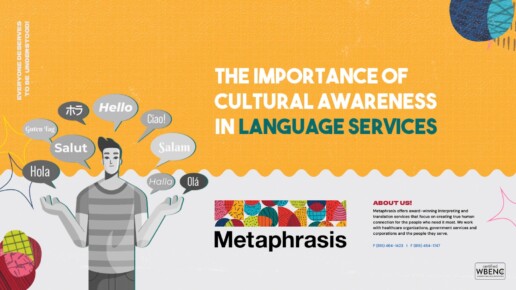The Importance of Cultural Awareness in Language Services: Enhancing Communication and Understanding Across Borders
Imagine walking into a hospital in a foreign country where you don’t speak the language. Now imagine trying to explain your symptoms or understand a diagnosis under those conditions. That’s the harsh reality for many individuals every day. In an increasingly globalized world, cultural awareness in language services isn’t just a nice-to-have — it’s a must.
Cultural awareness goes beyond translation. It’s about understanding the beliefs, behaviors, and nuances that shape how people communicate. Language services that incorporate cultural competence don’t just relay words — they bridge worlds. Metaphrasis are leading the charge in helping businesses, healthcare providers, and institutions communicate effectively across cultural divides. When done right, these services enhance understanding, reduce errors, and foster inclusivity.
Let’s dig deeper into why cultural awareness matters and how it’s revolutionizing language services today.
Cultural Competence in Language Services
Framework of Cultural Competence
Cultural competence refers to the ability of service providers to effectively deliver services that meet the social, cultural, and linguistic needs of clients. In language services, it means recognizing that translation or interpretation isn’t one-size-fits-all. A phrase that works perfectly in English might be confusing — or even offensive — in another culture if directly translated.
A robust cultural competence framework usually includes:
- Awareness: Recognizing your own cultural worldview and biases.
- Knowledge: Understanding cultural practices, values, and language nuances.
- Skills: Applying culturally appropriate communication techniques.
In the context of Metaphrasis, cultural competence isn’t just about language fluency; it’s about context. Their interpreters and translators are trained to pick up on non-verbal cues, tone, and cultural references that can change the entire meaning of a message.
Impact on Healthcare Delivery
In healthcare, cultural competence is quite literally a matter of life and death. Patients from different backgrounds may have unique beliefs about illness, treatment, and communication styles. Without culturally sensitive interpretation, these differences can lead to misdiagnoses, non-compliance with treatment, and a lack of trust in providers.
Consider this scenario: A patient who believes in holistic healing may be hesitant to accept a surgical solution. If a translator doesn’t understand that context and pushes a medical agenda without empathy, the patient might resist care entirely. Metaphrasis works with healthcare institutions to ensure interpreters are not only medically trained but also culturally tuned-in.
Research shows that culturally competent care leads to:
- Better patient engagement and satisfaction
- Reduced disparities in treatment outcomes
- Fewer medical errors due to miscommunication
By embedding cultural awareness into their language services, Metaphrasis plays a vital role in equitable healthcare delivery.
Strategies for Enhancing Language Services
Building a Diverse Workforce
You can’t offer culturally aware services without a culturally diverse team. That’s why successful language service providers like Metaphrasis invest in hiring professionals from a variety of ethnic and cultural backgrounds. A diverse workforce brings a broader understanding of languages and the cultural contexts in which they’re used.
Diversity also improves relatability. When clients see their own culture reflected in the service team, trust and communication naturally improve. This approach helps break down systemic barriers and fosters a more inclusive environment for clients and employees alike.
Recruitment strategies might include:
- Partnering with multicultural associations
- Offering flexible work arrangements for remote interpreters
- Mentorship programs for minority language speakers
Inclusion isn’t just a hiring metric — it’s a business imperative in language services.
Designing and Implementing Training Programs
Hiring bilingual staff is just the beginning. Cultural competence requires continuous training. Metaphrasis, for instance, ensures that interpreters and translators are educated not only in language fluency but also in cultural nuances, ethics, and industry-specific knowledge.
Effective training includes:
- Scenario-based learning: Real-world examples that highlight cultural misunderstandings and how to resolve them.
- Role-playing: Practicing interactions in sensitive settings like emergency rooms, courtrooms, or social service offices.
- Ongoing assessments: Ensuring language professionals are staying up-to-date with both linguistic and cultural shifts.
Training isn’t a one-time event; it’s an ongoing journey. As cultures evolve, so must our understanding of them.
Ensuring Compliance with Title VI and CLAS
Legal compliance is another crucial reason for integrating cultural awareness into language services. Title VI of the Civil Rights Act of 1964 mandates that any organization receiving federal funds must provide meaningful access to services for people with limited English proficiency (LEP). Similarly, the National CLAS (Culturally and Linguistically Appropriate Services) Standards provide a blueprint for ensuring equitable care.
Non-compliance can lead to lawsuits, loss of funding, and — more importantly — harm to the very communities organizations aim to serve.
Metaphrasis supports clients in aligning their services with these regulations by:
- Conducting audits and assessments of language access policies
- Providing documentation and reporting tools
- Offering CLAS-aligned training sessions for staff
Meeting these standards isn’t just about avoiding penalties — it’s about affirming a commitment to justice and equity.
Conclusion
In a world as diverse as ours, language services must do more than just translate words — they must translate meaning. Cultural awareness is the secret ingredient that turns simple communication into genuine connection. Whether in healthcare, legal, or community settings, the ability to understand not just what people say, but why they say it, can transform outcomes.
Organizations like Metaphrasis are leading the way by embedding cultural competence into every layer of their services. Through diverse hiring, targeted training, and a firm grasp of legal requirements, they ensure that no voice goes unheard and no message gets lost in translation.
If we truly want to communicate across borders, we must first learn to understand across cultures.

